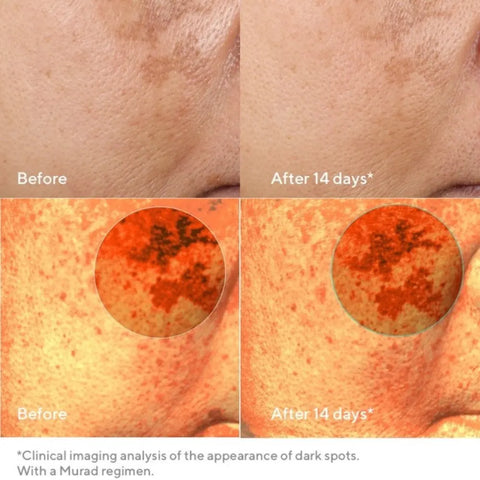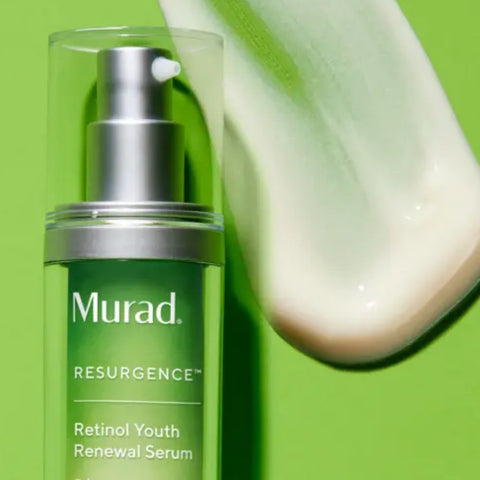The Best Ingredients to Look for in Dark Spot Correctors
Dark spots, also known as hyperpigmentation, are a stubborn skin concern for many - especially for those of us living in the tropics!
They manifest as patches or spots on the skin that are darker than the surrounding area and can significantly affect the uniformity and radiance of one's complexion. These spots can appear for many reasons, and understanding their causes is the first step in treating them effectively.
In this blog post, I'll explore the common reasons behind the formation of dark spots, explore some of the most effective ingredients in dark spot correctors, and review the best products for treating these concerns.
Dark Spots: Why They Appear
I know what you're thinking - there's more than one cause of these pesky things? Dark spots and blemishes can appear on skin for various reasons. Here's a quick run-through!
Post-Acne Marks
One of the most common triggers for dark spots is post-inflammatory hyperpigmentation (PIH), which occurs after an acne breakout. When the skin is inflamed, it can overproduce melanin as a response, leaving a dark mark after the pimple subsides.
PIH can appear regardless if you squeeze (or not) a breakout. Some skin tones such as deeper skin tones are more prone to this type of hyperpigmentation, and should be diligent about minimising inflammation as much as possible with soothing ingredients such as witch hazel and cica.
Sun Damage
Exposure to UV rays can cause an increase in melanin production as the skin tries to protect itself from sun damage. This often results in sun spots or age spots, particularly in areas frequently exposed to the sun, like the face, hands, and arms.
Sun damage can manifest as pigmentation slowly and over time - this type of hyperpigmentation can take years to truly show but develops for a long time before it's visible to the naked eye! The best way to prevent this is with diligent sunscreen habits, and wearing a hat and sunglasses to minimise sun exposure.
Pollution
One surprising cause of dark spots is pollution, a problem often faced by city dwellers. Like UV rays, pollution is linked to free radicals and oxidative damage on skin cells.
Pollution is a significant risk factor for a type of dark spot called melasma. This leads to areas of hyperpigmentation that appear as larger patches on the face. While it seems difficult to defend skin against something that is in our environment, this blog post will feature ingredients and skincare tips to reduce the effect pollution may have on skin!
Hormones
Fluctuating hormones can be a cause of dark spots, too. The type of hyperpigmentation it's most commonly associated with is also melasma. This most commonly affects women during pregnancy.
In most cases, the pigmentation naturally subsides during the postpartum period, however some women may find that their pigmentation is more stubborn to fade and needs some extra help to get on top of.
Effective Ingredients for Fading Dark Spots
To combat dark spots effectively, selecting the right ingredients is crucial. These ingredients work by different mechanisms to reduce the appearance of hyperpigmentation.
Vitamin C
Vitamin C is a powerful antioxidant that serves multiple roles in skincare. It's a skincare ingredient that I recommend everyone has in their skincare routine for glowing skin! When it comes to tackling the appearance of blemish and dark spots, it acts as a tyrosinase inhibitor, blocking the enzyme responsible for melanin production.
By doing so, it helps prevent new dark spots from forming while also diminishing existing ones. The results from Vitamin C can appear as soon as 6 weeks and can take up to 12 weeks for full effect.
Additionally, its antioxidant properties protect against free radical damage from UV exposure, which can lead to further darkening of spots. There are multiple forms of Vitamin C used in skincare, so it's an ingredient that (depending on the formula) can be tolerated by even the most sensitive of skin.
Glycolic Acid
Glycolic acid, an alpha hydroxy acid (AHA), accelerates the shedding of the top layers of the skin, encouraging new, lighter skin cells to replace them. This process of cellular renewal is critical in fading dark spots.
Like Vitamin C, glycolic acid also inhibits tyrosinase, making it a double-duty ingredient against hyperpigmentation. However, glycolic acid can be a strong skincare ingredient - if your skin is very sensitive, it's not something that I would suggest for you.
Retinol
Retinol is well-known for its powerful anti-aging properties, but it is also effective in skin tone correction. It works by speeding up cell turnover, similar to glycolic acid, helping to fade dark spots over time.
It definitely takes longer compared to Vitamin C for example, but it's a great ingredient to reach for to help maintain blemish-free skin.
Niacinamide
Niacinamide, or vitamin B3, is a gentler option that has been shown to be effective in reducing dark spots.
It is known for reducing skin inflammation and melanin production, niacinamide offers a brightening effect without the harshness of stronger acids. It's an ingredient that's slowly becoming more common in almost all skin care products!
Antioxidants
Antioxidants like resveratrol and green tea extract not only help in fighting free radicals but also play a role in preventing the enzymatic processes that lead to pigmentation. As a general guide, almost all antioxidants help with this!
Incorporating antioxidant ingredients into your skincare routine can help protect against new dark spots and reduce existing discolouration.
Best Types of Dark Spot Correcting Products
When choosing products to treat dark spots, it’s important to consider the formulation and the active ingredients. Here are some of the most effective types of dark spot correctors:
Peels

Chemical peels, such as those containing glycolic acid, are effective because they remove the upper layer of dead skin cells, promoting regeneration and reducing the appearance of dark spots.
Professional strength peels can get results faster, but often have downtime and visibly peeling skin afterwards. There are lower-strength peels that are safe to use at home, such as the Dermalogica PowerBright Dark Spot Peel. One of the latest in Dermalogica's product line up, this peel is a new addition to the PowerBright line.
It features a blend of AHAs and PHAs to slough away dead skin cells and fade dark spots, while is balanced with the right blend of moisturising ingredients to avoid dryness and irritation.
Our tip? Use an at-home peel once a week at night to brighten skin and fade imperfections.
Vitamin C Serums

Serums concentrated with Vitamin C are particularly good at fading dark spots due to their high concentration of active ingredients. Typically, these serums are best used daily in the morning to help defend your skin against the day's stressors, helping to reduce the appearance of current pigmentation and minimise it from further darkening.
Some skincare brands, like Murad, combine the brightening benefits of more than just Vitamin C in the serum for efficacy, like in the Murad Vita C Glycolic Brightening Serum. This supercharged serum has shown amazing results in studies to improve skin tone!
Retinol Serums

Retinol serums assist with anti-aging and correct dark spots. Used as a nightly treatment, they're great for getting flawless skin with consistent use.
Our favourite recommendation is the Murad Retinol Youth Renewal Night Serum. It has the perfect blend of nurturing ingredients with an effective concentration of retinol to support skin renewal. Use nightly and always remember to wear SPF in the daytime!
Niacinamide Moisturisers

This is the gentlest option of the bunch, but it also has a drawback in that it will take the longest to see results. However, this is a great option for sensitive and very dry skin as moisturisers containing niacinamide not only help in fading dark spots but also enhance skin barrier function.
Our number one choice is another choice from the Dermalogica PowerBright line - the Dermalogica PowerBright Overnight Cream. It's fortified with Niacinamide plus a gentle form of Vitamin C to help target the appearance of hyperpigmentation on skin.
Dark Spot Correctors: Key Takeaways
Understanding the causes of dark spots and choosing the right ingredients and products is key to effectively treating them. By incorporating products with ingredients like Vitamin C, glycolic acid, retinol, niacinamide, and antioxidants into your skincare routine, you can achieve a more even-toned and radiant complexion.
Remember, consistency is crucial, as the effects of these ingredients accumulate over time. Always pair your treatment with sunscreen to protect your skin and prevent further damage.


